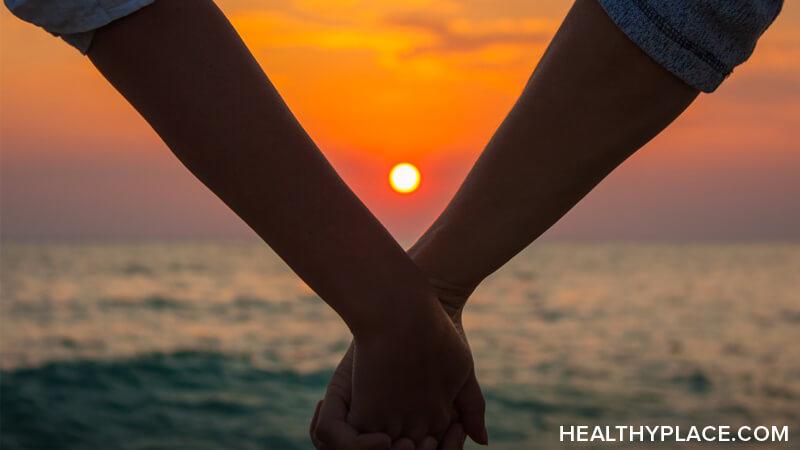PTSD and Relationships: On Love and Loss

Developing intimate relationships when you have posttraumatic stress disorder (PTSD) can feel heavy, confusing, and downright terrifying at times. Growing up, I was a hypervigilant child, always trying to keep everyone safe. I didn't feel like I could trust anyone — especially not myself — and so I developed compulsions to forge a sense of control. I'd lock the door several times before bed, sometimes racing downstairs at 2 a.m. to check it was still locked. I'd turn down invites to sleepovers because I felt like I had to be with my parents in order to protect them (from what, I'm not sure). I'd ruminate for hours about the betrayals I'd faced and the roles I played in them. Posttraumatic stress disorder was making itself known in my relationships early.
As I got older, I began to notice how misunderstood and unseen I felt. I wondered how I could convince someone to see my side of the story — to get to the core of who I was and why I was acting in these ways. Perhaps that's why I started writing and sharing so openly.
When I started dating, I thought maybe this was it. Maybe someone really could see all of me — and not only see me but also love me.
Posttraumatic Stress Disorder and My Relationships
As a woman in her late 20s, I've had my fair share of romantic relationships — some beautiful and healing, others gut-wrenching and damaging. Because of my trauma, I've struggled with trust (in myself and in my partners), intimacy, and authentic communication. When I say "trust," I don't mean that I fear someone will be disloyal and cheat on me. No, my fears are much deeper than that. I worry someone will put me in danger, manipulate me, take advantage of me, or even lie to me and compromise my sexual health. This is a vulnerable thing to admit, but it's simply part of dating after being sexually assaulted.
In high school, the first man I truly opened up to ended up using my childhood sexual assault as blackmail during a fight. He told me no one could ever love me, that I was damaged, and that my story was "embarrassing." I believed him. I carried that with me for quite some time. It's no wonder I never feel good enough in relationships, even to this day. (It's something I'm working on and, thankfully, have been making progress.)
This type of trauma and abuse has led me to compromise my values and often seek love in the wrong places. Then, when I end up getting hurt or acting in ways I'm not proud of, I shame myself so deeply that I end up worse off than before. The effects of PTSD on a relationship have become a vicious cycle at times.
But it's true what they say: what happened to you is not your fault, but it is your responsibility to heal. I cannot — and will not — use my childhood assault as an excuse to allow myself to accumulate even more trauma. Relationships with PTSD are difficult but not impossible. It just takes a certain type of partner to support and love you through your healing.
Thankfully, over time, I have also attracted good people and positive experiences. But when those relationships didn't work out, it felt like my world was crumbling. It felt like all my safety — my sense of home — was ripped away from me.
Loving and Losing Relationships with PTSD
Losing someone you love from a breakup is its own kind of torture. While heartbreak is painful for anyone, regardless of their history with trauma, it's especially confusing and harrowing for someone with PTSD.
It's hard for me to connect with someone fully, so when I do, it's usually a deep emotional bond. I'm not someone who can do "casual" dynamics or give myself away physically unless I am in love and feel 100 percent safe with the person. In other words, when I fall — which really isn't often — I fall hard.
All the loneliness, self-hatred, and shame from my childhood momentarily dissolve when I look into someone else's eyes and see my own grief on their face. But what happens when that love is taken away? What happens when a person decides to leave? What happens when I'm left only with myself — alone again?
In the past, I've viewed breakups as confirmation that everyone will betray or abandon me. The little girl inside of me tells me that person never loved or cared about me — that they only wanted one thing, or perhaps they saw me fully and decided I actually wasn't what they wanted. It feeds narratives that confirm how unloveable I am, just like that high-school crush told me.
These old beliefs do not serve me, and I've been working to release them. I've noticed my progress, but I've also noticed my inner critic will raise its voice any opportunity it has. It feels impossible to break the cycle sometimes, but I know healing isn't linear, and you don't need to be fully healed to be loved.
Forming Relationships with PTSD
To anyone who is dating and forming relationships with PTSD, know that you're not alone. Your thoughts might be powerful and loud, but they don't define you or your future. They're simply not true.
Loving and losing is a part of life. While some people might experience more heartbreak than others, I like to view my adversities as opportunities. Maybe I went through all of this for a reason, and maybe that reason is to share my experiences (like I am right now) with other people who are suffering.
Opening your heart after trauma takes courage, and mending a broken heart by yourself takes real strength and power. These human experiences are reminders that we are still alive — still trying. How beautiful is that?
I hope you never give up. I hope you know you are worthy of love despite what you've been through and what your brain is telling you. I hope you find true love — and I hope you find it in yourself first.
APA Reference
Caramela, S.
(2024, April 7). PTSD and Relationships: On Love and Loss, HealthyPlace. Retrieved
on 2025, December 17 from https://www.healthyplace.com/blogs/traumaptsdblog/2024/4/ptsd-and-relationships-on-love-and-loss
